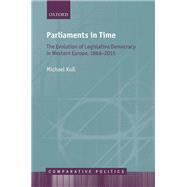Parliaments in Time The Evolution of Legislative Democracy in Western Europe, 1866-2015
, by Koß, Michael- ISBN: 9780198766919 | 0198766912
- Cover: Hardcover
- Copyright: 1/29/2019
Comparative Politics is a series for researchers, teachers, and students of political science
that deals with contemporary government and politics. Global in scope, books in the series
are characterized by a stress on comparative analysis and strong methodological rigour. The
series is published in association with the European Consortium for Political Research. For
more information visit: www.ecprnet.eu
The series is edited by Emilie van Haute, Professor of Political Science, Université libre de
Bruxelles; Ferdinand Müller-Rommel, Director of the Center for the Study of Democracy,
Leuphana University; and Susan Scarrow, John and Rebecca Moores Professor of Political
Science, University of Houston.
How can we explain the evolution of legislatures in Western Europe? This book analyses
ninety procedural reforms which restructured control over the plenary agenda and
committee power in Britain, France, Sweden, and Germany between 1866 and 2015.
Legislatures evolve towards one of two procedural ideal types: talking (where governments
control the agenda) or working legislatures (with powerful committees). All else being
equal, legislators' demand for mega-seats on legislative committees triggers the evolution
of working legislatures. If, however, legislators fail to centralize agenda control in
response to anti-system obstruction, legislative procedures break down. Rather than
a decline of legislatures, talking legislatures accordingly indicate the resilience of
legislative democracy. In conclusion, the book shows the causal nexus between
procedural reforms and (legislative) democracy.
that deals with contemporary government and politics. Global in scope, books in the series
are characterized by a stress on comparative analysis and strong methodological rigour. The
series is published in association with the European Consortium for Political Research. For
more information visit: www.ecprnet.eu
The series is edited by Emilie van Haute, Professor of Political Science, Université libre de
Bruxelles; Ferdinand Müller-Rommel, Director of the Center for the Study of Democracy,
Leuphana University; and Susan Scarrow, John and Rebecca Moores Professor of Political
Science, University of Houston.
How can we explain the evolution of legislatures in Western Europe? This book analyses
ninety procedural reforms which restructured control over the plenary agenda and
committee power in Britain, France, Sweden, and Germany between 1866 and 2015.
Legislatures evolve towards one of two procedural ideal types: talking (where governments
control the agenda) or working legislatures (with powerful committees). All else being
equal, legislators' demand for mega-seats on legislative committees triggers the evolution
of working legislatures. If, however, legislators fail to centralize agenda control in
response to anti-system obstruction, legislative procedures break down. Rather than
a decline of legislatures, talking legislatures accordingly indicate the resilience of
legislative democracy. In conclusion, the book shows the causal nexus between
procedural reforms and (legislative) democracy.






